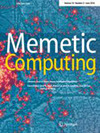Memetic Computing 期刊简介

Memes have been defined as basic units of transferrable information that reside in the brain and are propagated across populations through the process of imitation. From an algorithmic point of view, memes have come to be regarded as building-blocks of prior knowledge, expressed in arbitrary computational representations (e.g., local search heuristics, fuzzy rules, neural models, etc.), that have been acquired through experience by a human or machine, and can be imitated (i.e., reused) across problems.
The Memetic Computing journal welcomes papers incorporating the aforementioned socio-cultural notion of memes into artificial systems, with particular emphasis on enhancing the efficacy of computational and artificial intelligence techniques for search, optimization, and machine learning through explicit prior knowledge incorporation. The goal of the journal is to thus be an outlet for high quality theoretical and applied research on hybrid, knowledge-driven computational approaches that may be characterized under any of the following categories of memetics:
Type 1: General-purpose algorithms integrated with human-crafted heuristics that capture some form of prior domain knowledge; e.g., traditional memetic algorithms hybridizing evolutionary global search with a problem-specific local search.
Type 2: Algorithms with the ability to automatically select, adapt, and reuse the most appropriate heuristics from a diverse pool of available choices; e.g., learning a mapping between global search operators and multiple local search schemes, given an optimization problem at hand.
Type 3: Algorithms that autonomously learn with experience, adaptively reusing data and/or machine learning models drawn from related problems as prior knowledge in new target tasks of interest; examples include, but are not limited to, transfer learning and optimization, multi-task learning and optimization, or any other multi-X evolutionary learning and optimization methodologies.
模因被定义为存在于大脑中的可传递信息的基本单位,并通过模仿过程在人群中传播。从算法的角度来看,模因已被视为先验知识的基础,以任意计算表示 (例如,局部搜索启发式,模糊规则,神经模型等) 表示,这些表示是通过经验获得的。人或机器,并且可以在问题上模仿 (即重复使用)。
模因计算期刊欢迎将上述模因的社会文化概念纳入人工系统的论文,特别强调增强计算和人工智能技术在搜索,优化,以及通过显式先验知识整合的机器学习。因此,该期刊的目标是成为高质量的理论和应用研究的出口,这些理论和应用研究的混合,知识驱动的计算方法,其特征可能是以下任何类别的模因:
类型1: 通用算法与人工设计的启发式算法相结合,可以捕获某种形式的先验领域知识; 例如,传统的模因算法将进化全局搜索与特定于问题的局部搜索混合在一起。
类型2: 具有自动选择,适应,并从各种可用选择中重用最合适的启发式方法; 例如,学习全局搜索运算符和多个本地搜索方案之间的映射,给定手头的优化问题。
类型3: 自主学习经验的算法,自适应地重用从相关问题中提取的数据和/或机器学习模型作为感兴趣的新目标任务中的先验知识; 示例包括但不限于转移学习和优化、多任务学习和优化、或任何其他多X进化学习和优化方法。
|
期刊ISSN
|
1865-9284 |
|
影响指数
|
5.841 |
|
最新CiteScore值
|
8.30 查看CiteScore评价数据 |
|
最新自引率
|
2.00% |
|
官方指定润色网址
|
https://www.deeredit.com/?type=ss1 |
|
投稿语言要求
|
Improve the quality of the paper, eliminate grammar and spelling errors, increase readability, ensure accurate communication of viewpoints, enhance academic reputation, and increase the chances of the paper being accepted. 建议点击这个网址:https://www.deeredit.com/?type=ss2,资深审稿专家为您评估稿件质量,提供针对性改进建议,最终可助您极大提升目标期刊录用率 |
|
期刊官方网址
hot |
https://www.peipusci.com/?type=9 |
|
杂志社征稿网址
hot |
https://www.peipusci.com/?type=10 |
|
通讯地址
|
TIERGARTENSTRASSE 17, HEIDELBERG, GERMANY, D-69121 |
|
偏重的研究方向(学科)
|
COMPUTER SCIENCE, ARTIFICIAL INTELLIGENCE-OPERATIO |
|
出版周期
|
|
|
出版年份
|
2009 |
|
出版国家/地区
|
GERMANY |
|
是否OA
|
No |
|
SCI期刊coverage
|
Science Citation Index Expanded(科学引文索引扩展) |
|
NCBI查询
|
PubMed Central (PMC)链接 全文检索(pubmed central) |
|
最新中科院JCR分区
|
大类(学科)
小类(学科)
综述期刊
工程技术
COMPUTER SCIENCE, ARTIFICIAL INTELLIGENCE(计算机:人工智能)3区
OPERATIONS RESEARCH & MANAGEMENT SCIENCE(运筹学与管理科学)3区
否
|
|||||
|
最新的影响因子
|
5.841 | |||||
| 最新公布的期刊年发文量 |
|
|||||
| 总被引频次 | 26 | |||||
| 影响因子趋势图 |
近年的影响因子趋势图(整体平稳趋势)
|
|||||
2022年预警名单预测最新

|
最新CiteScore值
|
8.30
|
||||||||||||||
| 年文章数 | 24 | ||||||||||||||
|
SJR
|
0.825 | ||||||||||||||
|
SNIP
|
1.997 | ||||||||||||||
|
CiteScore排名
|
|
||||||||||||||
| CiteScore趋势图 |
CiteScore趋势图
|
||||||||||||||
|
本刊同分区等级的相关期刊
|
|
| 期刊名称 | IF值 |
| Flexible Services and Manufacturing Journal | 2.577 |
| IIE TRANSACTIONS | 2.713 |
| SYSTEMS & CONTROL LETTERS | 2.776 |
| INTERNATIONAL JOURNAL OF SYSTEMS SCIENCE | 2.258 |
| Memetic Computing | 5.841 |
| INTERNATIONAL JOURNAL OF INFORMATION TECHNOLOGY & DECISION MAKING | 2.198 |
| COMPUTERS & OPERATIONS RESEARCH | 3.968 |
| INTERNATIONAL JOURNAL OF COMPUTER INTEGRATED MANUFACTURING | 3.173 |
| TRANSPORTATION SCIENCE | 4.076 |
| 分享者 | 点评内容 |





